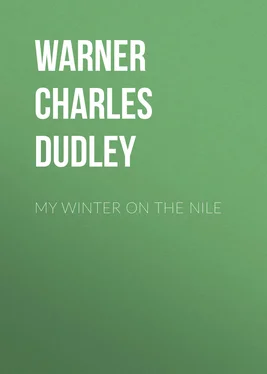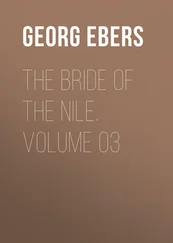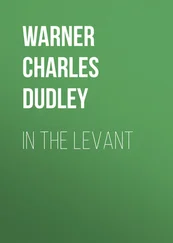Charles Warner - My Winter on the Nile
Здесь есть возможность читать онлайн «Charles Warner - My Winter on the Nile» — ознакомительный отрывок электронной книги совершенно бесплатно, а после прочтения отрывка купить полную версию. В некоторых случаях можно слушать аудио, скачать через торрент в формате fb2 и присутствует краткое содержание. Жанр: Путешествия и география, История, foreign_edu, foreign_antique, foreign_prose, на английском языке. Описание произведения, (предисловие) а так же отзывы посетителей доступны на портале библиотеки ЛибКат.
- Название:My Winter on the Nile
- Автор:
- Жанр:
- Год:неизвестен
- ISBN:нет данных
- Рейтинг книги:5 / 5. Голосов: 1
-
Избранное:Добавить в избранное
- Отзывы:
-
Ваша оценка:
- 100
- 1
- 2
- 3
- 4
- 5
My Winter on the Nile: краткое содержание, описание и аннотация
Предлагаем к чтению аннотацию, описание, краткое содержание или предисловие (зависит от того, что написал сам автор книги «My Winter on the Nile»). Если вы не нашли необходимую информацию о книге — напишите в комментариях, мы постараемся отыскать её.
My Winter on the Nile — читать онлайн ознакомительный отрывок
Ниже представлен текст книги, разбитый по страницам. Система сохранения места последней прочитанной страницы, позволяет с удобством читать онлайн бесплатно книгу «My Winter on the Nile», без необходимости каждый раз заново искать на чём Вы остановились. Поставьте закладку, и сможете в любой момент перейти на страницу, на которой закончили чтение.
Интервал:
Закладка:
In the handsome Ezbekeëh park or garden, where there are shady walks and some fine sycamores and banyans to be seen, a military band plays every afternoon, while the foreigners of both sexes, and Egyptian men promenade. Of course no Egyptian lady or woman of respectability is ever seen in so public a place. In another part of the garden, more retired, a native band is always playing at nightfall. In this sheltered spot, under the lee of some gigantic rock and grotto-work are tables and chairs, and a divan for the band. This rock has water pleasantly running through it, but it must have been struck by somebody besides Moses, for beer is brought out of its cool recesses, as well. Rows of men of all colors and costumes may be seen there, with pipe and mug and coffee cup; and on settees more elevated and next the grotto, are always sitting veiled women, in outer wrappers of black silk, sometimes open enough to show an underskirt of bright color and feet in white slippers. These women call for beer or something stronger, and smoke like the men; they run no risk in being in this publicity, for they have nothing to lose here or elsewhere. Opposite them on a raised divan, not unlike a roomy bedstead, sits the band.
It is the most disreputable of bands. Nothing in the whole East so expressed to me its fagged-out dissoluteness as this band and its performances. It is a sleepy, nonchalant band, as if it had been awake all the previous night; some of its members are blear-eyed, some have one eye, some have two; they are in turbans, in tarbooshes, in gowns of soiled silk, of blue cotton, of white drilling. It is the feeblest band; and yet it is subject to spurts of bacchantic fervor. Sometimes all the instruments are striving together, and then only one or two dribble the monotonous refrain; but somehow, with all the stoppings to light cigarettes and sip coffee, the tune is kept groaning on, in a minor that is as wild as the desert and suggestive of sin.
The instruments are as African as the music. There is the darabooka , a drum made of an earthen or wooden cylinder with a flaring head, over which is stretched a parchment; the tar , a kind of tambourine; kemengeh , a viol of two strings, with a cocoa-nut sounding-body; the kanoon , an instrument of strings held on the knees, and played with the fingers; the ’.od , a sort of guitar with seven double strings; played with a plectrum, a slip of vultures’ feather held between the thumb and finger; and the nay , a reed-flute blown at the end.
In the midst of the thumbing and scraping, a rakish youth at the end, is liable, at any moment, to throw back his head and break out in a soft womanish voice, which may go no farther than a nasal yah, ah, m-a-r-r , that appears to satisfy his yearnings; or it may expand into a droning song, “ Ya benat Iskendereeyeh, ” like that which Mr. Lane renders:—
“O ye damsels of Alexandria!
Your walk over the furniture is alluring:
Ye wear the Kashmeer shawl with embroidered work,
And your lips are sweet as sugar.”
Below the divan sit some idlers or supernumeraries, who, as inclination moves them, mark the rhythm by striking the palms of the hands together, or cry out a prolonged ah-yah , but always in a forgetful, uninterested manner, and then subside into silence, while the picking and throbbing of the demoralized tune goes on. It is the “devilish iteration” of it, I think, that steals away the senses; this, and some occult immorality in the debased tune, that blots virtue out of the world. Yet there is something comic in these blinking owls of the night, giving sentimental tongue to the poetic imagery of the Eastern love-song—“for a solitary gazelle has taken away my soul”:—
“The beloved came to me with a vacillating gait;
And her eyelids were the cause of my intoxication.
I extended my hand to take the cup;
And was intoxicated by her eyes.
O thou in the rose-colored dress!
O thou in the rose-colored dress!
Beloved of my heart! remain with me.”
Or he pipes to the “dark-complexioned, and with two white roses”:—
“O damsel! thy silk shirt is worn out, and thine arms have become visible,
And I fear for thee, on account of the blackness of thine eyes.
I desire to intoxicate myself, and kiss thy cheeks,
And do deeds that Antar did not.”
To all of which the irresponsible chorus, swaying its head, responds O! y-a-a-a-h! And the motley audience sips and smokes; the veiled daughters of sin flash invitation from their kohl-stained eyes; and the cool night comes after the flaring heat of the day; and all things are as they have been for thousands of years. It is time to take you to something religious.
The Howling Derweeshes are the most active religionists in the East; I think they spend more force in devotion than the Whirling Derweeshes, though they are probably not more meritorious. They exceed our own western “Jumpers,” and by contrast make the worship of our dancing Shakers tame and worldly. Of all the physical manifestations of religious feeling there is none more warming than the zikr of these devotees. The derweeshes are not all wanderers, beggars, saints in patched garments and filthy skin; perhaps the most of those who belong to one of the orders pursue some regular occupation; they are fishermen, laborers in the fields, artisans, and water-carriers, and only occasionally join in the ceremonies, processions and zikrs of their faith. I have seen a laborer drop into the ring, take his turn at a zikr , and drop out again, very much as the western man happens in and takes a hand in a “free fight,” and then retires.
This mosque at which the Howling Derweeshes perform is circular, and large enough to admit a considerable number of spectators, who sit, or stand against the wall. Since the exercise is one of the sights of the metropolis, and strangers are expected, it has a little the air of a dress-parade, and I could not but fear that the devotion lost somewhat of its singleness of purpose. When we enter, about forty men stand in an oblong ring facing each other; the ring is open towards the mehhrab , or niche which marks the direction of Mecca. In the opening stands the Sheykh, to direct the performance; and at his left are seated the musicians.
The derweeshes have divested themselves of turbans, fezes, outer gowns and slippers, which lie in a heap in the middle of the circle, an indistinguishable mass of old clothes, from which when the owners come to draw they cannot fail to get as good as they deposited. The ceremony begins with a little uneasiness on the part of the musical instruments; the sheykh bows his head and brings the palms of his hands together; and the derweeshes, standing close together, with their hands straight at their sides, begin slowly to bow and to sway to the right in a compound motion which is each time extended. The daraboo-ka is beaten softly and the ’.od is picked to a slow measure. As the worshippers sway, they chant, La ilaha illa-llah (“There is no deity but God”) in endless repetition, and imperceptibly quickening the enunciation as they bow more rapidly. The music gets faster, and now and again one of the roguish boys who is thumping the drum breaks out into vocal expression of his piety or of his hilarity. The circle is now under full swing, the bowings are lower and much more rapid, and the ejaculation has become merely Allah, Allah, Allah , with a strong stress on the final syllable.
The peculiarities of the individual performers begin to come out. Some only bow and swing in a perfunctory manner; others throw their strength into the performance, and their excitement is evinced by the working of the face and the rolling of the eyes. Many of them have long hair, which has evidently known neither scissors nor comb for years, and is matted and twisted in a hopeless tangle. One of the most conspicuous and the least clad, a hairy man of the desert, is, exactly in apparel and features, like the conventional John the Baptist. His enormous shock of faded brown hair is two feet long and its ends are dyed yellow with henna. When he bends forward his hair sweeps the floor, and when he throws his head back the mass whips over with a swish through the air. The most devout person, however, is a negro, who puts all the fervor of the tropics into his exercise. His ejaculations are rolled out with extraordinary volume, and his black skin shines with moisture; there is, too, in his swaying and bowing, an abandon , a laxity of muscles, and a sort of jerk that belong only to his sympathetic race.
Читать дальшеИнтервал:
Закладка:
Похожие книги на «My Winter on the Nile»
Представляем Вашему вниманию похожие книги на «My Winter on the Nile» списком для выбора. Мы отобрали схожую по названию и смыслу литературу в надежде предоставить читателям больше вариантов отыскать новые, интересные, ещё непрочитанные произведения.
Обсуждение, отзывы о книге «My Winter on the Nile» и просто собственные мнения читателей. Оставьте ваши комментарии, напишите, что Вы думаете о произведении, его смысле или главных героях. Укажите что конкретно понравилось, а что нет, и почему Вы так считаете.












